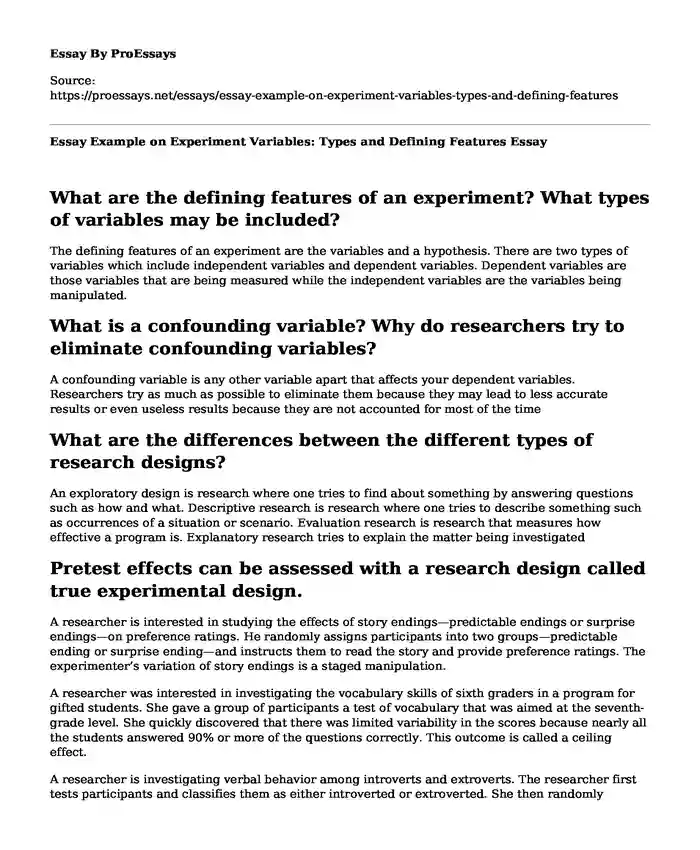What are the defining features of an experiment? What types of variables may be included?
The defining features of an experiment are the variables and a hypothesis. There are two types of variables which include independent variables and dependent variables. Dependent variables are those variables that are being measured while the independent variables are the variables being manipulated.
What is a confounding variable? Why do researchers try to eliminate confounding variables?
A confounding variable is any other variable apart that affects your dependent variables. Researchers try as much as possible to eliminate them because they may lead to less accurate results or even useless results because they are not accounted for most of the time
What are the differences between the different types of research designs?
An exploratory design is research where one tries to find about something by answering questions such as how and what. Descriptive research is research where one tries to describe something such as occurrences of a situation or scenario. Evaluation research is research that measures how effective a program is. Explanatory research tries to explain the matter being investigated
Pretest effects can be assessed with a research design called true experimental design.
A researcher is interested in studying the effects of story endings—predictable endings or surprise endings—on preference ratings. He randomly assigns participants into two groups—predictable ending or surprise ending—and instructs them to read the story and provide preference ratings. The experimenter’s variation of story endings is a staged manipulation.
A researcher was interested in investigating the vocabulary skills of sixth graders in a program for gifted students. She gave a group of participants a test of vocabulary that was aimed at the seventh-grade level. She quickly discovered that there was limited variability in the scores because nearly all the students answered 90% or more of the questions correctly. This outcome is called a ceiling effect.
A researcher is investigating verbal behavior among introverts and extroverts. The researcher first tests participants and classifies them as either introverted or extroverted. She then randomly assigns participants to a high-anxiety or a low-anxiety social group and observes the number of words spoken by participants. The researcher wants to learn more about the effects of both personality style (introversion or extroversion) and social situation (high or low anxiety) on verbal behavior. In this case, verbal behavior is defined as the number of verbal communications uttered within a five-minute observation period. What type of design is this? Provide an example of a possible main effect that might emerge from this study. Additionally, provide an example of a possible interaction that might emerge.
This is exploratory research as the researcher tries to explore something and in this case, he/she tries to explore verbal behavior among introverts and extroverts. A possible interaction that might emerge is the researcher may end up discovering a third variable which is an ambivert, This is a person who is neither an introvert nor an extrovert.
Consider the following scenario: Jill is conducting an experiment on the effects of story themes—traditional versus nontraditional—on memory for story details. She is paying participants $5 to complete a research protocol that takes about 40 minutes. Prior to beginning the protocol, participants sign a consent form. Jill is present during this time to answer questions and clarify areas of concern. One participant, Sarah, reads the consent form, agrees to participate, and begins the protocol. After about 12 minutes, she gets up and tells Jill that she has to go. She says she is sorry but she cannot complete the protocol. Jill offers her an additional $10 to stay in the study and complete the required tasks.
Jill offering Sarah an additional ten dollars is unethical. A participant should not have money as the major motivating factor when participating in an experiment as he/she will most likely give inaccurate results. In this case, Sarah may participate in the experiment just for the sake of money. She will be at a higher chance of lying or providing false results. What Jill should have done instead is to explain and answer any concerns that Sarah had. According to Section B of Association Code of Ethics titled: Confidentiality and Privacy, Jill was met with as task of creating trust between Sarah and the experiment but he instead chose to offer her money. In the beginning, Sarah was comfortable participating in the study willingly and something in the protocol might have changed her mind and made her want to walk away. She might not have been comfortable sharing some information. Jill was supposed to talk to her and explain that everything she shares would be confidential and would only be used for the sake of the study. Offering her money did not do anything in helping her feel comfortable. As a result of this, she may provide inaccurate results.
Cite this page
Essay Example on Experiment Variables: Types and Defining Features. (2023, Sep 10). Retrieved from https://proessays.net/essays/essay-example-on-experiment-variables-types-and-defining-features
If you are the original author of this essay and no longer wish to have it published on the ProEssays website, please click below to request its removal:
- Critical Essay on Astonishing the Blind by Jack Hodgins
- Film Analysis Essay: Schindler's List
- A Star is Born (1937) Film Essay Example
- Film Analysis Essay on Law Abiding Citizen
- The Life and Legacy of Elsa Schiaparelli - Essay Example
- Essay on the Parent Trap: A Classic Romantic Comedy-Drama About Growing Up
- Explore Global Datasets: World Bank Data Platforms







